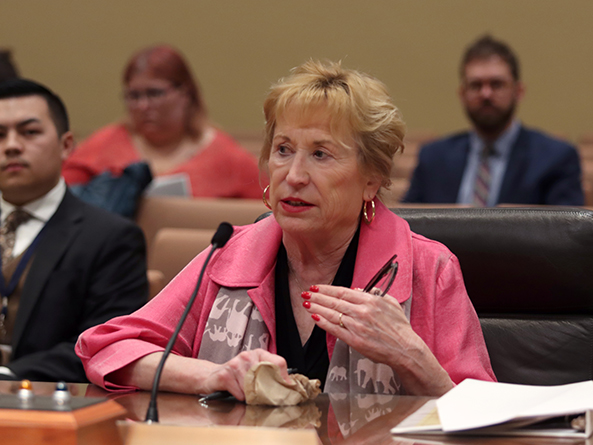Voter approval for certain school bonds proposed
The Education Committee heard testimony Jan. 24 on a bill intended to ensure that voters must approve certain bonds issued to pay for the construction of school buildings.

LB299, introduced by Elkhorn Sen. Lou Ann Linehan, would prohibit any joint entity that includes a Nebraska school district or educational service unit from issuing bonds without approval from a majority of their qualified voters in a special election. The restriction would apply to joint public entities created on or after the bill’s effective date.
If the bond question fails, it could not be submitted to voters again for at least six months.
Linehan said school districts typically must ask their voters to approve a bond issue for a specific amount to pay for a new building. However, districts can get around that requirement by partnering with another political subdivision to form a joint public entity, which can issue bonds without voter approval, she said.
Linehan said LB299 would close this “loophole” and ensure that school districts cannot ignore the will of voters when incurring debt.
“When you don’t get buy-in from your community,” she said, “you’re going to have lingering hurt feelings.”
Jessica Shelburn, state director of Americans for Prosperity-Nebraska, testified in support of the proposal. In some cases, she said, school districts have formed joint public entities to issue bonds for new buildings after a traditional bond election has failed.
Circumventing the will of voters in such a way is “disrespectful,” Shelburn said.
Jason Alexander, superintendent of Beatrice Public Schools, testified in opposition to LB299, saying it would override the authority of local elected officials.
Alexander said the district recently formed a joint public entity with its ESU to issue bonds for a new elementary school after four existing schools were cited for more than two dozen safety violations. This approach allows the district to pay off the bonds without raising its property tax levy or imposing an additional bond issue tax, he said.
The Beatrice school board considered a traditional bond election, Alexander said, but decided against it because five of six school bond issues had failed since 1991.
The committee took no immediate action on the bill.


